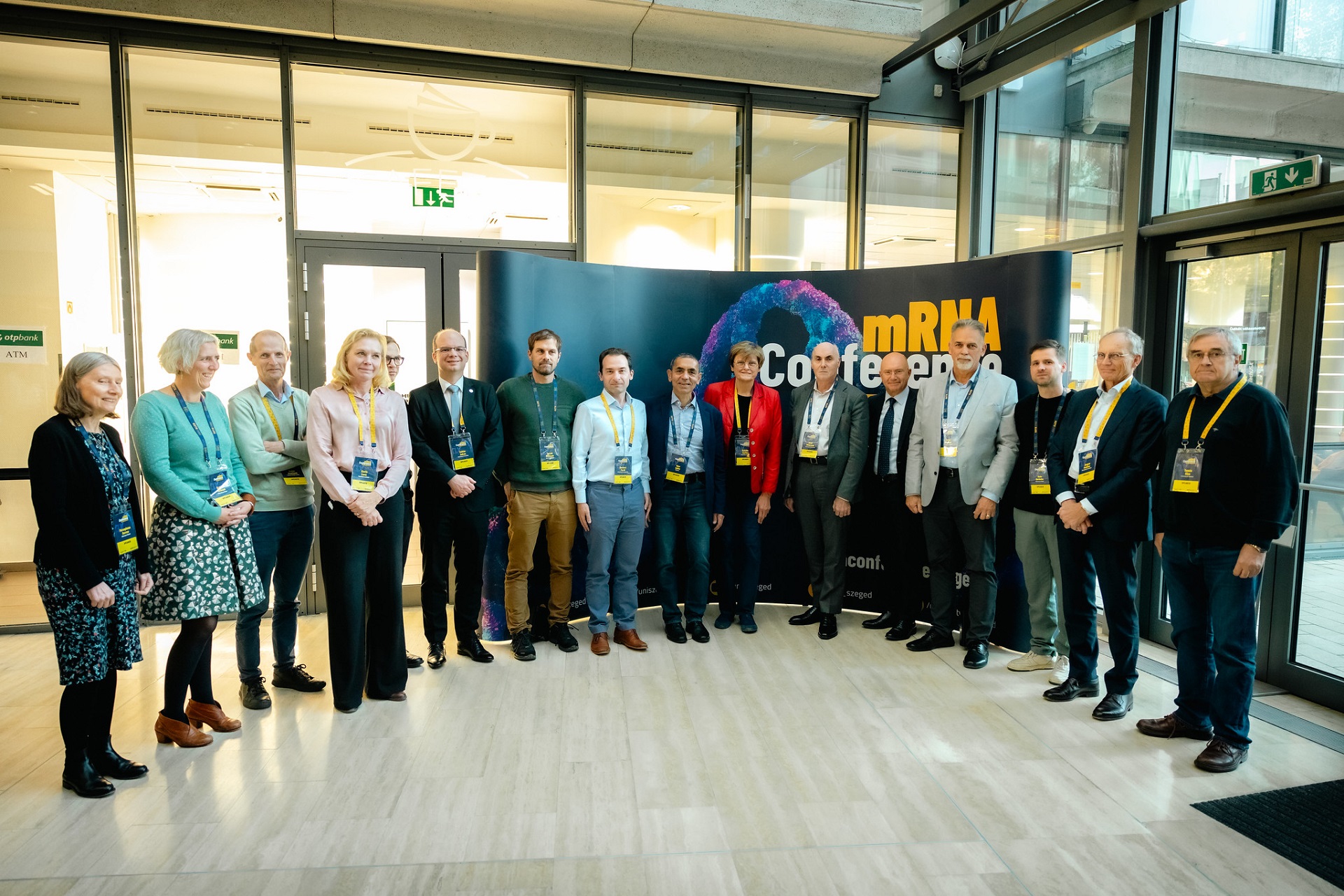
“mRNA: More Applications than Limitations” was the headline of the article on the University of Szeged’s news portal, highlighting presentations by seven of the 15 researchers featured at the mRNA conference organized by the Novo Nordisk Foundation and the University of Szeged. For those who were unable to attend the event on November 7–8, 2024, this follow-up provides an overview of research insights shared by eight additional distinguished speakers: Rein Verbeke, Nicolas Manel, Zoltán Kis, Norbert Pardi, Katrien Remaut, Gerald Schwank, Zoltán Jakus, and Katalin Karikó.
“Szeged in the Global Spotlight as mRNA Conference Kicks Off,” we reported on November 7, 2024, when Katalin Karikó, professor at the University of Szeged, delivered her opening remarks at the conference. Her speech, laced with personal anecdotes, marked her return to her alma mater to create an international forum dedicated to exploring a small yet profoundly significant niche in biology, one with the potential to shape the future of medicine.
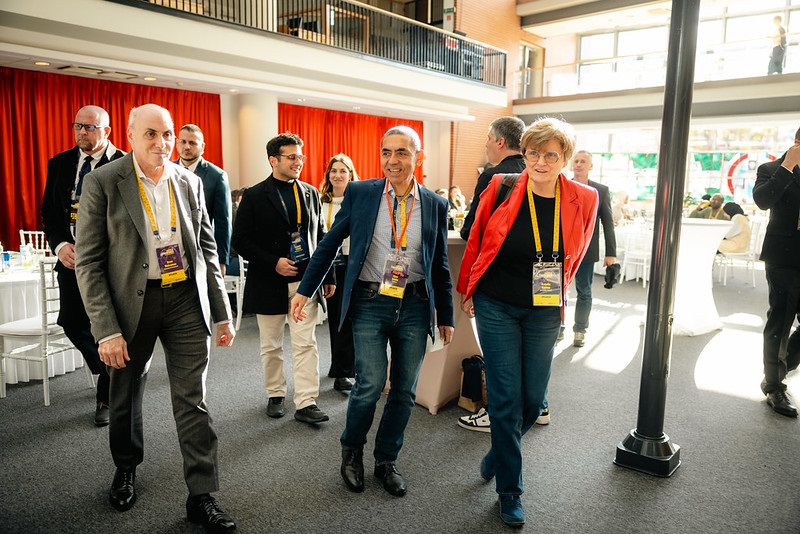
Drew Weissman, Uğur Şahin, and Katalin Karikó, recipients of the Novo Nordisk Prize, at the mRNA Conference, hosted by the University of Szeged at the József Attila Study and Information Center and funded by the Novo Nordisk Foundation
The first installment of our article, titled “mRNA: More Applications than Limitations,” provided a summary of the presentations by seven researchers – Drew Weissman, Karin Loré, Antal Nógrádi, Uğur Şahin, Robin Shattock, Persephone Borrow, and Tamás Kiss – highlighting key topics from the mRNA Conference in Szeged. In this follow-up, we discuss the research topics of eight additional scientists – Rein Verbeke, Nicolas Manel, Zoltán Kis, Norbert Pardi, Katrien Remaut, Gerald Schwank, Zoltán Jakus, and Katalin Karikó – in the order in which they spoke at the conference.
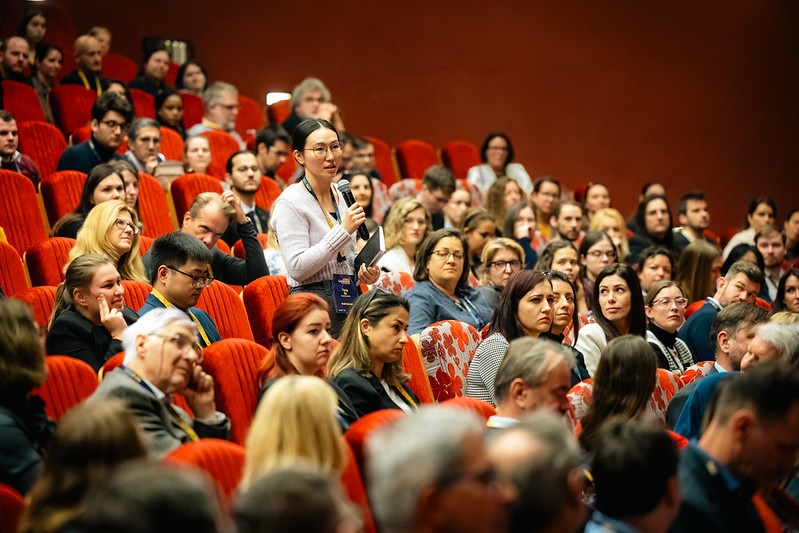
The presentations at the mRNA Conference generated tremendous interest, with researchers answering numerous questions after their talks.
FIGHTING CANCER
The first day of the mRNA Conference began with a morning session featuring presentations by two senior officials from the Novo Nordisk Foundation, a keynote address by Drew Weissman, and a talk by Karin Loré. Following the lunch break and press conference, Rein Verbeke was the first to take the stage.
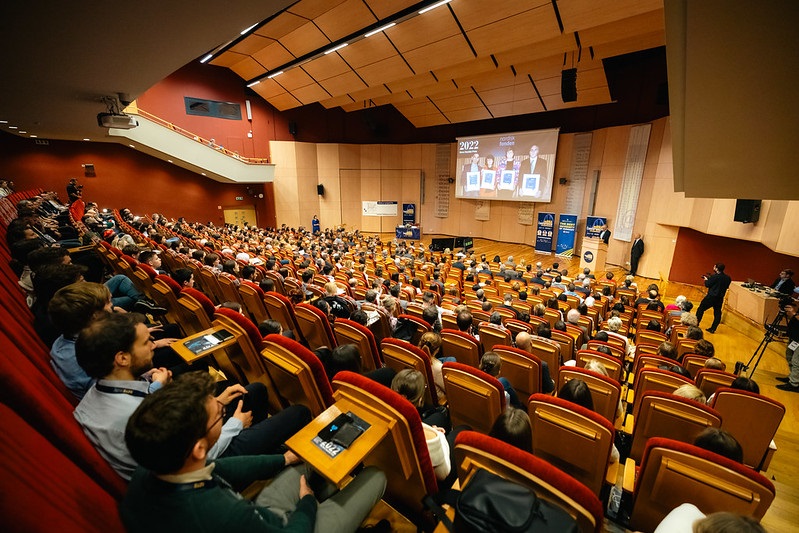
The mRNA Conference in Szeged began with presentations on the Novo Nordisk Foundation and the prestigious Novo Nordisk Prize.
REIN VERBEKE: Clinical Translation of an mRNA Cancer Vaccine Adjuvanted with Alpha-Galactosylceramide
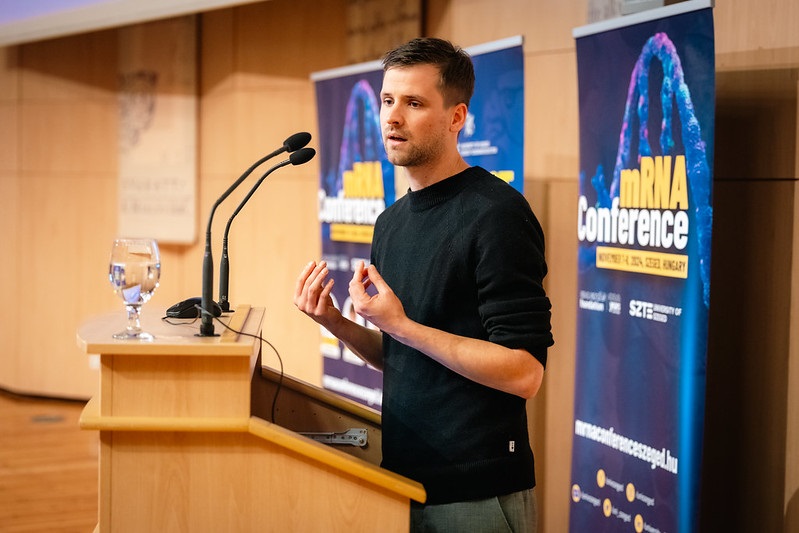
Rein Verbeke
Rein Verbeke is a senior postdoctoral researcher in the Ghent Research Group on Nanomedicines (GeRN) at Ghent University and director of the Ghent Nanomedicine Center. His doctoral dissertation focused on the design of mRNA-LNPs and the adjuvant effects of mRNA vaccines that stimulate immune responses. In 2022, he further investigated the role of LNPs in enhancing the immunogenicity of mRNA vaccines, joining a research group at the University of British Columbia.
During the COVID-19 pandemic, the effectiveness of protection provided by the Comirnaty (BNT162b2) and Spikevax (mRNA1273) vaccines demonstrated that mRNA-based vaccines represent the next generation of immunizations. Looking ahead, the goal of mRNA vaccine development is to make them applicable not only for preventing infections but also for treating cancer.
As Verbeke explained, research in this area has revealed that combining mRNA vaccines with adjuvants (immune stimulants) can significantly enhance immune responses. For instance, incorporating the adjuvant α-galactosyl-ceramide (αGC) into lipid nanoparticles has been shown to strengthen cell-based immunity while also triggering broader innate immune activation. The first vaccine developed using this innovative approach is already undergoing human clinical trials, specifically for patients with non-small cell lung cancer.
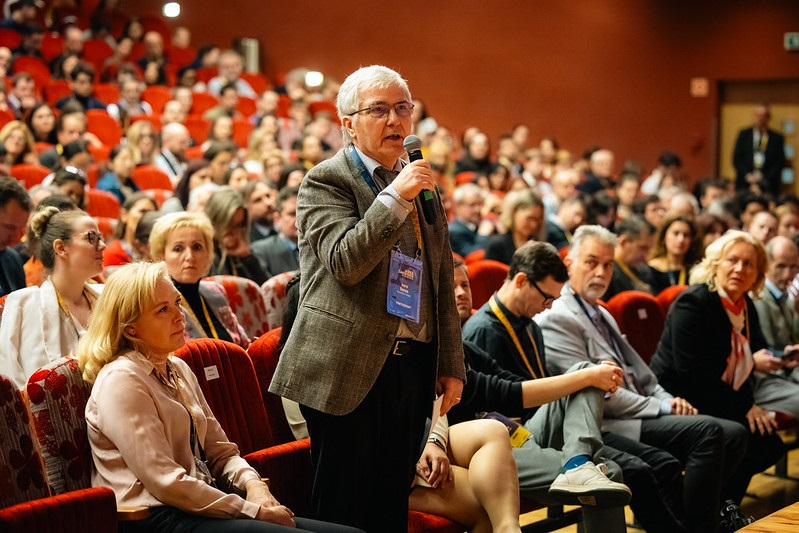
Imre Boros, Professor Emeritus of the University of Szeged, directed questions to several speakers at the mRNA conference.
NICOLAS MANEL: Immunotherapy with a cGAS mRNA
Nicolas Manel earned his doctorate from the University of Montpellier in France and completed his postdoctoral training at New York University. He is a senior INSERM researcher at the Curie Institute in Paris. His research group has played a pioneering role in studying the cGAS-STING pathway in the context of HIV infection. Currently, they are investigating the regulation of innate receptors in responses to viruses and the body’s own tissues, as well as their implications in aging and potential applications in immunotherapy.
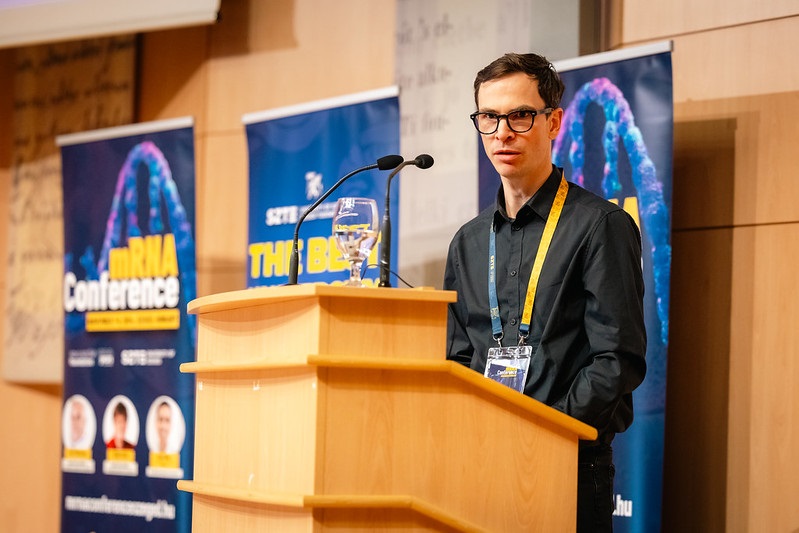
Nicolas Manel
Agents that stimulate the DNA-sensing cGAS-STING pathway are being investigated for cancer immunotherapy in both preclinical and clinical settings; however, the optimal method for activation remains unclear.
“In our research, we designed a nucleoside-modified mRNA encoding a form of cGAS* that autoactivates without the need for exogenous DNA. Delivered systemically using lipid nanoparticles, it induces endogenous cGAMP production, which in turn activates the STING pathway. The cGAS*-mRNA-LNP administered this way elicits anti-tumor effects in various synergistic cancer models by activating CD8+ T cells and enhancing the recognition of tumor antigens. This approach offers a novel opportunity in cancer immunotherapy,” the researcher explained.
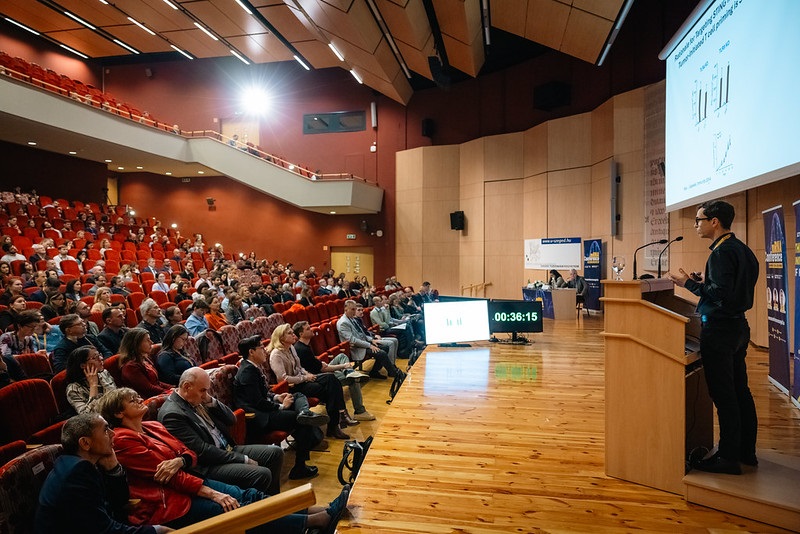
THE SIGNIFICANCE OF A SHIFT IN APPROACH
Nicolas Manel’s presentation was followed by that of Antal Nógrádi, a professor at the University of Szeged, after which researcher Zoltán Kis took to the stage.
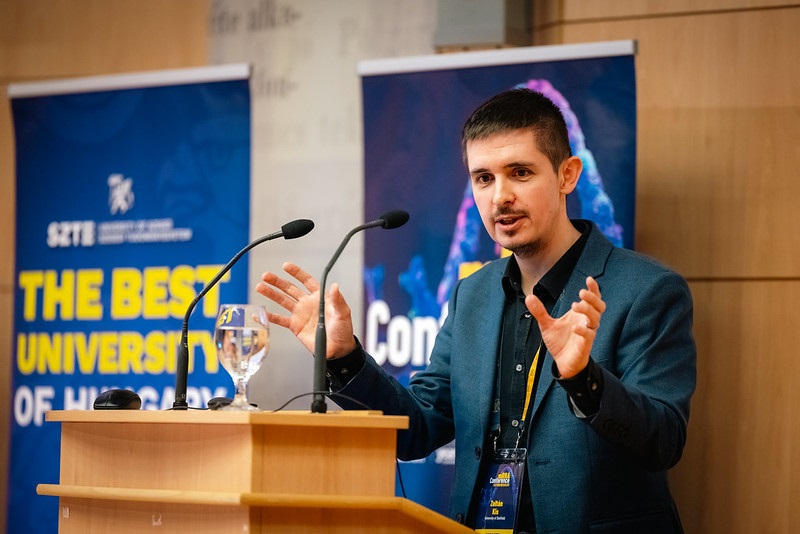
Zoltán Kis
ZOLTÁN KIS: Intensified, Continuous and Digitalised Production of High-Quality mRNA Medicines at Low Cost
Zoltán Kis is an associate professor at the University of Sheffield and an honorary lecturer at Imperial College London. His research group specializes in advancing manufacturing technologies for RNA-based vaccines and therapies. The aim of his work is to facilitate the rapid, high-quality, and cost-effective production of RNA-based vaccines, irrespective of disease type.
mRNA technology is revolutionizing the development of vaccines and therapies for a variety of diseases, driving increased demand for scalable and cost-effective manufacturing processes.
“We integrate multiple cutting-edge technologies: intensified production methods, advanced analytics, computational modeling, and real-time data analysis. Our Quality by Digital Design (QbDD) principle enables the establishment of connections between critical process parameters and quality attributes, facilitating automation and control,” explained the presenter.
Manufacturing operations have shifted from batch-based production to continuous processes, significantly boosting bioreactor productivity and achieving a 7- to 10-fold increase in yield. “Our new, intensive, continuous oligo-dT chromatography method ensures high recovery rates while preserving mRNA integrity and purity. Additionally, new digitized process configurations reduce the production costs of high-quality mRNA-based drugs,” the researcher noted.
These advancements accelerate the development and mass production of mRNA-based therapies, improving global access and outcomes for patients worldwide.
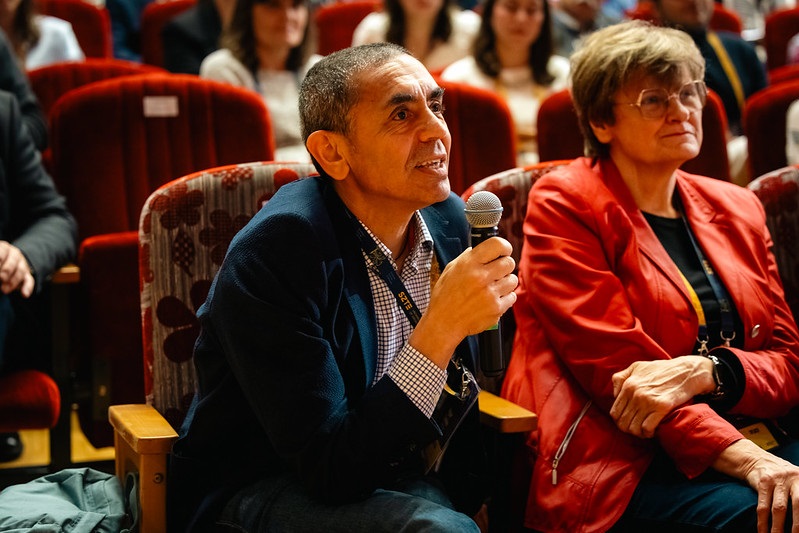
Uğur Şahin and Katalin Karikó
EXPLORER OF LIPID PARTICLES
The first day of the conference concluded with a talk by Uğur Şahin, while on the second day, November 8, 2024, the sessions began with a presentation by Robin Shattock, followed by a talk from Norbert Pardi.
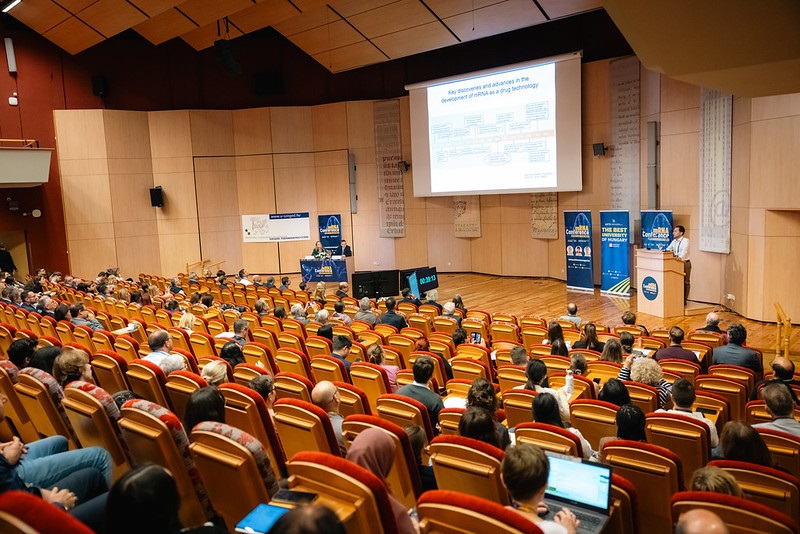
NORBERT PARDI: Lipid Nanoparticles for mRNA Vaccine Delivery
Norbert Pardi has been affiliated with the University of Pennsylvania since 2001 and currently serves as an associate professor in the Department of Microbiology at the Perelman School of Medicine, where he heads his own laboratory. Holding a PhD in biochemistry and genetics from the University of Szeged, he is a pioneer in nucleoside-modified mRNA vaccine technology, having authored groundbreaking studies that have significantly advanced the field.
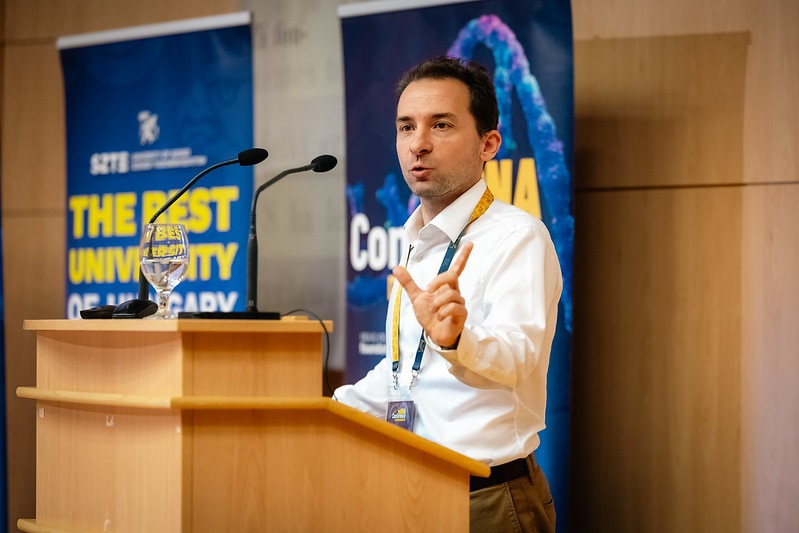
Norbert Pardi
In line with the fact that lipid nanoparticles are a key component of today’s mRNA vaccines, the presenter discussed the mechanisms of mRNA-lipid nanoparticles as delivery systems and outlined the challenges researchers faced due to RNA’s inherent instability. One major hurdle was posed by the low efficiency of RNA translation into proteins, which was addressed through modifications such as replacing uridine with pseudouridine. To overcome delivery challenges, RNA was encapsulated in lipid nanoparticles. Interestingly, researchers found that these LNPs not only facilitated the delivery of mRNA molecules but also unexpectedly enhanced the vaccine’s efficacy – a surprising discovery at the time.
Norbert Pardi also addressed the topic of designing and modifying lipid particles used to encapsulate RNA to serve different purposes. Specifically, these particles are composed of polyethylene glycol, phospholipids, and ionizable lipids. By adjusting the ratios of these components, LNPs can elicit different immune responses and exhibit distinct adjuvant effects. Additionally, altering the lipid composition enables LNPs to deliver RNA to specific organs, such as the heart or spleen.
Dr. Pardi’s talk was primarily based on his own studies, some of which have yet to be published – with his account of groundbreaking findings captivating the audience and prompting numerous questions.
(An interview with Norbert Pardi about his research will be published soon.)
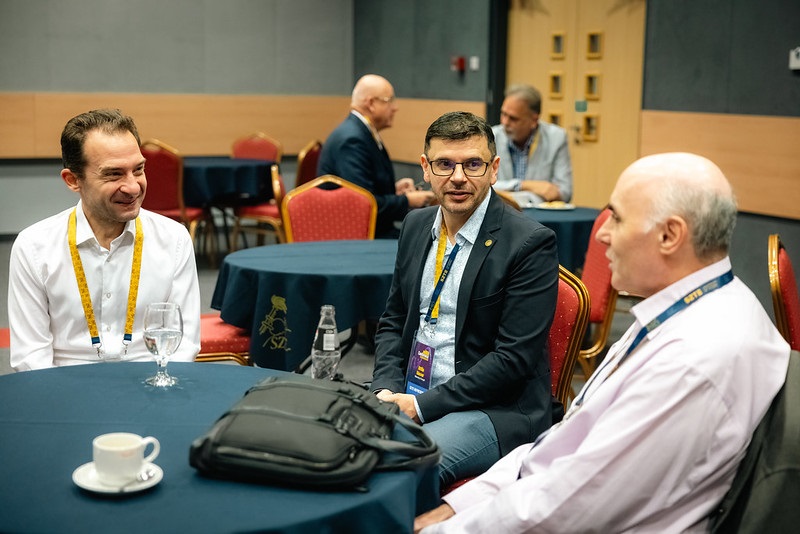
During a conference break: Norbert Pardi, Attila Gácser, and Drew Weissman (left to right)
After the presentation by the researcher affiliated with the University of Szeged, Persephone Borrow delivered her talk, which was followed by Katrien Remaut’s presentation.
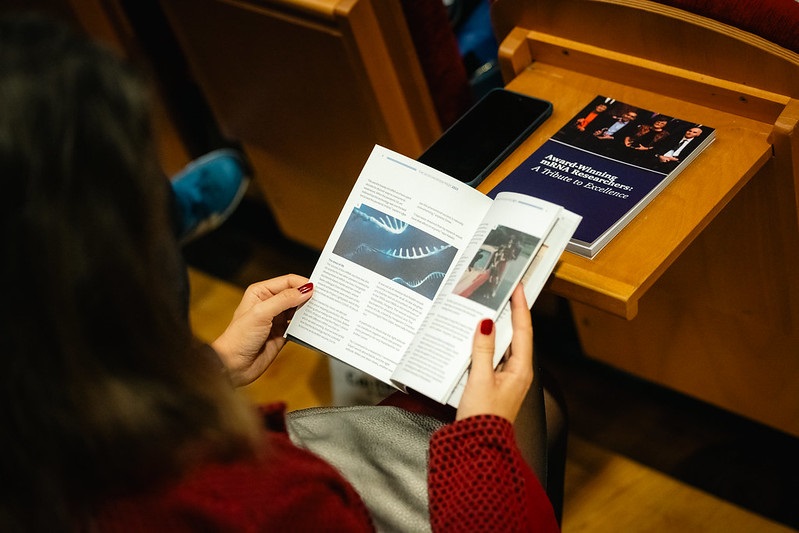
THE EYE, THE LIVER, AND THE LYMPHATIC SYSTEM
KATRIEN REMAUT: Lipid Nanoparticle Mediated mRNA Delivery to the Retina
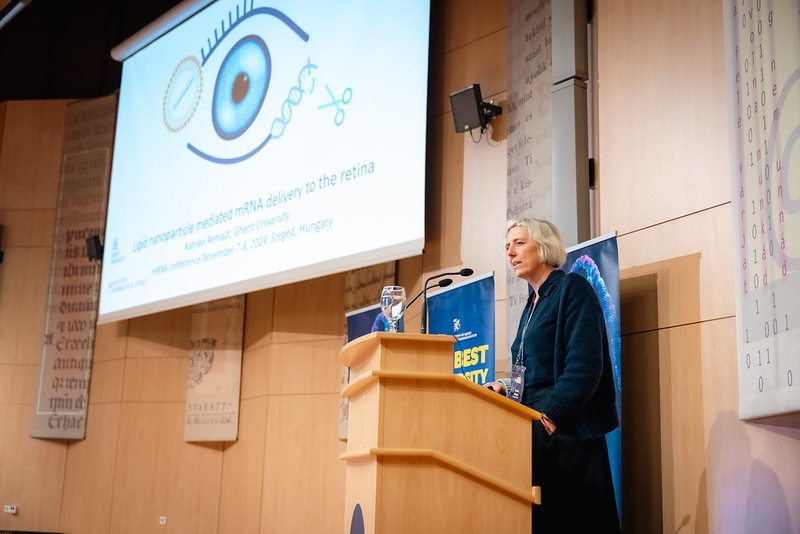
Katrien Remaut
Katrien Remaut is an associate professor at Ghent University. She is the author of over 100 scientific publications and serves as an editor for prominent pharmaceutical journals. Her work focuses on developing safe and effective lipid nanoparticles for retinal mRNA delivery.
Delivering mRNA to the retina holds promise for treating various ophthalmic diseases, as it enables transient protein expression, which can be beneficial for processes such as cell reprogramming or gene editing. However, the efficient delivery of mRNA poses significant challenges due to numerous extracellular and intracellular barriers, which were detailed in the presentation. Research to date has involved testing various lipid nanoparticle (LNP) formulations, some of which have effectively protected mRNA from degradation. Nonetheless, the ILM membrane covering the retinal surface has proven to be a major obstacle to the penetration of mRNA into the retina.
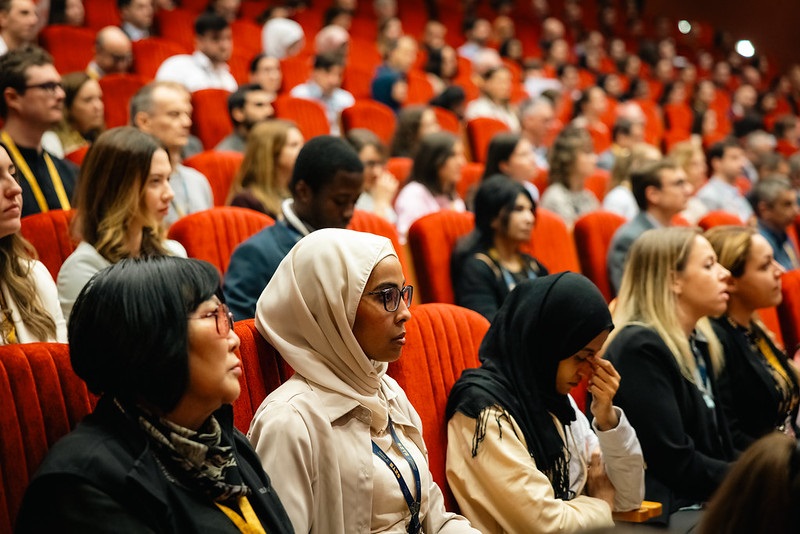
The first half of the second day of the conference concluded with a presentation by Tamás Kiss, an alumnus of the University of Szeged. After a short break, Gerald Schwank and Zoltán Jakus followed with their presentations.
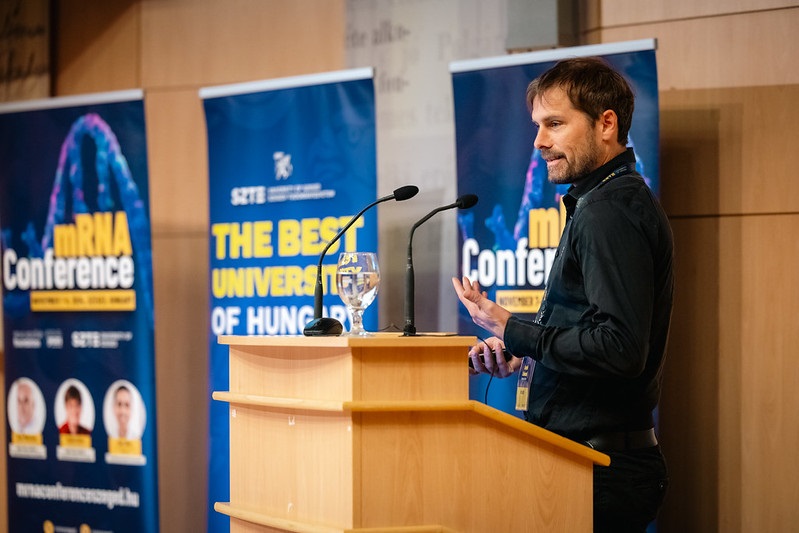
Gerald Schwank
Gerald Schwank, an associate professor at the University of Zurich’s Faculty of Medicine, specializes in translational genome editing. In 2015, he established his own laboratory, with research funded by the Swiss National Science Foundation (SNSF) and the European Research Council (ERC).
The use of mRNA lipid nanoparticles (mRNA-LNPs) represents a novel and promising method for delivering gene editors to the liver. This approach is safer than virus-based alternatives and allows for temporary gene editing as well as repeated treatments. Using this technology, researchers have successfully delivered various gene-editing tools, including CRISPR-Cas9 and base editors, to liver cells in both preclinical (laboratory) and clinical settings.
“In our studies, we effectively corrected genetic mutations, such as those responsible for phenylketonuria (PKU), in mice and macaques. Additionally, we conducted detailed analyses of different regions of the liver to pinpoint where gene editing occurs,” the presenter explained.
ZOLTÁN JAKUS: Development of a Nucleoside-modified mRNA-based Platform to Induce Organ-pecific Lymphatic Growth and Reverse Experimental Lymphedema
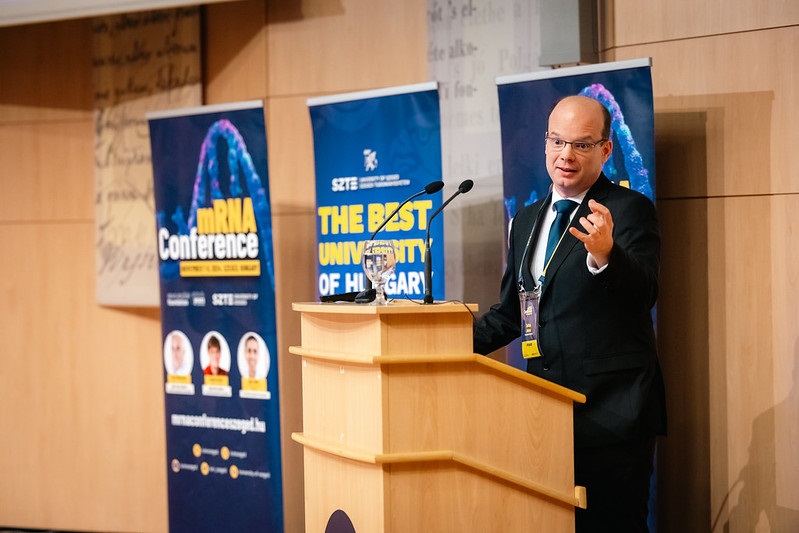
Zoltán Jakus
Zoltán Jakus, an associate professor at Semmelweis University, holds a doctorate in general medicine and a PhD in molecular and cellular physiology. He carried out his postdoctoral work at the University of Pennsylvania. His research group focuses on investigating the organ-specific functions of the lymphatic system and the signaling pathways involved in lymphangiogenesis, studied in preclinical animal models.
The absence or dysfunction of the lymphatic system can result in secondary lymphedema, which severely impairs the function of affected organs and significantly reduces patients’ quality of life.
“Currently, there is no definitive treatment for lymphedema,” Dr. Jakus explained. “To address this, we used nucleoside-modified mRNA encapsulated in lipid nanoparticles (LNPs) to encode Vascular Endothelial Growth Factor C (VEGFC). This approach aims to stimulate lymphatic growth and alleviate experimental lymphedema in mouse models.”
The findings revealed that a single low-dose application of mRNA-LNP led to sustained lymphatic growth and the development of a functional lymphatic network, effectively reversing experimental lymphedema without causing significant side effects.
The final presentation of the symposium was delivered by Katalin Karikó, bringing the Szeged mRNA Conference to a close.
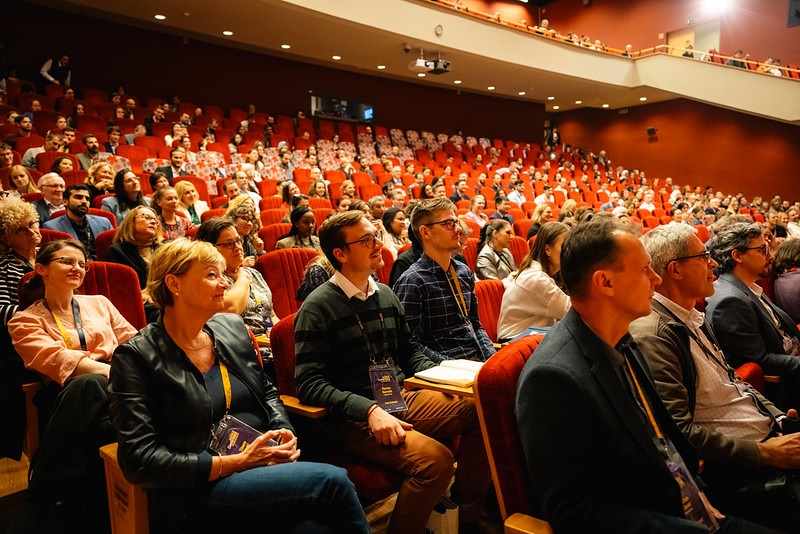
THERAPY: THE ULTIMATE GOAL
KATALIN KARIKÓ: Developing mRNA for Therapy – My Journey
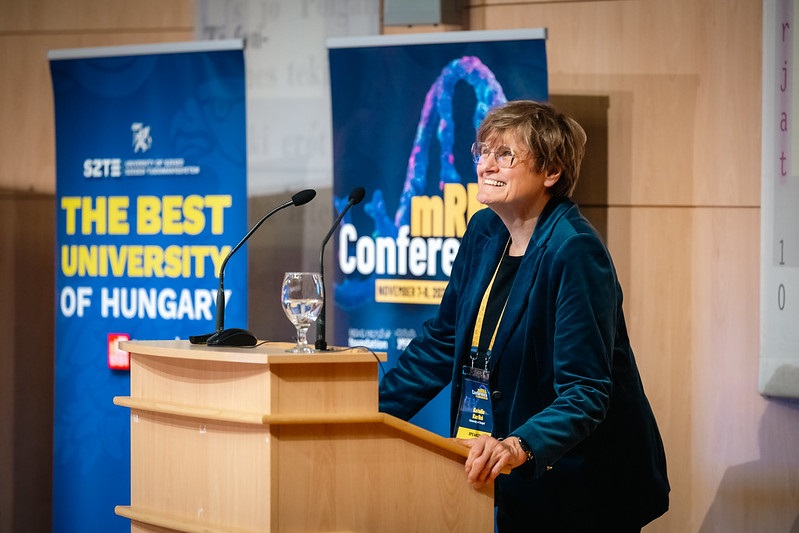
Katalin Karikó
Katalin Karikó is a professor at the University of Szeged and an adjunct professor at the University of Pennsylvania. A trailblazer in mRNA-based therapeutic technology, she discovered that nucleoside modifications reduce the immunogenicity of mRNA, paving the way for broader therapeutic applications. Her groundbreaking patent, developed in collaboration with Drew Weissman, forms the basis of the BioNTech/Pfizer and Moderna COVID-19 vaccines. In recognition of their achievements, they were jointly awarded the 2023 Nobel Prize in Physiology or Medicine. Previously, Katalin Karikó served as Vice President at BioNTech and co-founded RNARx.
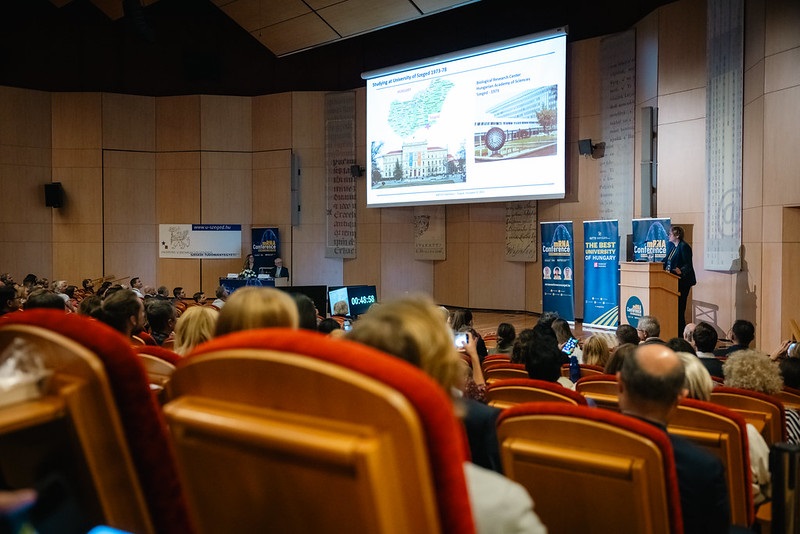
In the closing lecture of the symposium, held at Katalin Karikó’s alma mater with support from the Novo Nordisk Foundation, the Nobel laureate professor connected mRNA research to the University of Szeged, highlighting the field’s key milestones in both global and chronological contexts. She explained that mRNA was discovered in 1961, but it took 60 years to develop the first FDA-approved mRNA-based vaccine during the COVID-19 pandemic. She also pointed out that over the decades, numerous scientists contributed to key advancements in the field. For instance, in 1978, it was demonstrated that isolated mRNA could produce proteins in mammalian cells, while the introduction of in vitro transcription in 1984 made it possible to produce mRNA coding for any desired protein using the appropriate DNA template.
“Initially, the medical application of mRNA was hindered by its inflammatory nature, but my colleagues and I solved this problem by substituting uridine with pseudouridine,” she noted. This innovation paved the way for nucleoside-modified mRNA, formulated with lipid nanoparticles, to be used as a potential vaccine platform.
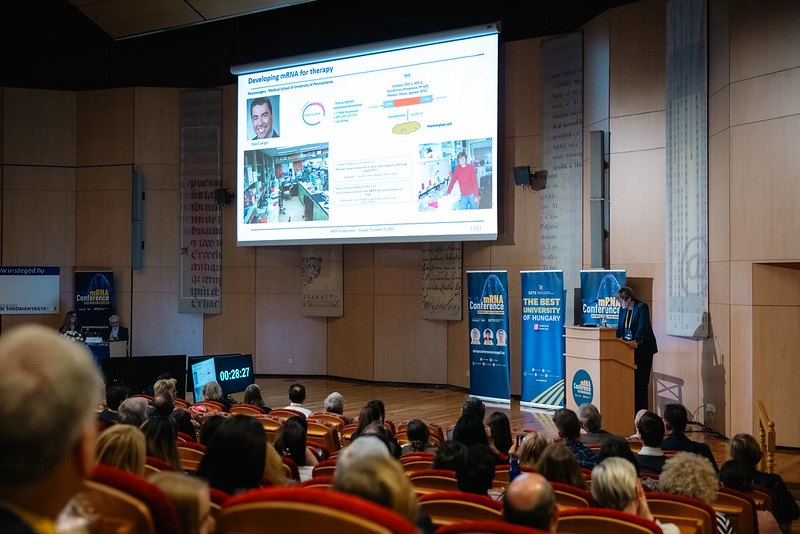
Katalin Karikó charted the evolution of messenger RNA up to the present day and, in line with the earlier speakers at the international mRNA conference held on November 7–8, 2024, shed light on the promising possibilities that lie ahead.
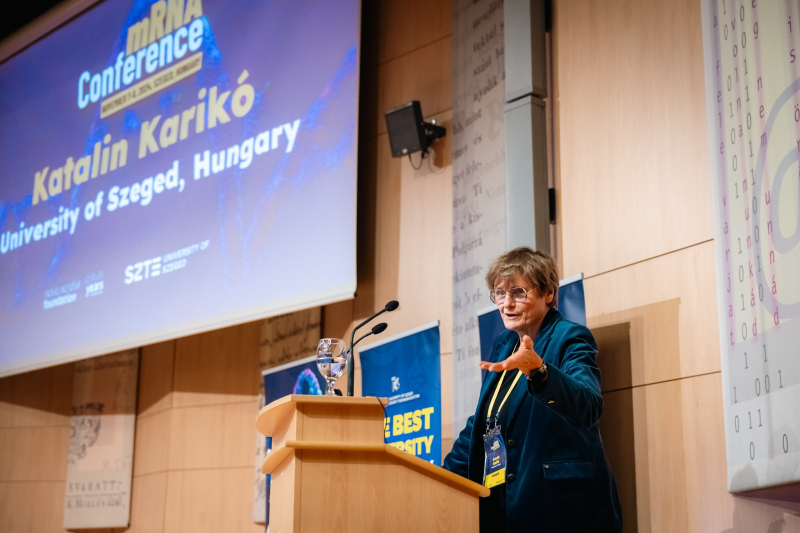
It’s no secret that Katalin Karikó personally determined the lineup of invited speakers and the order of presentations for the Szeged conference. (Joanna Kowalska, one of the scheduled presenters, was unable to attend the event in Szeged.)
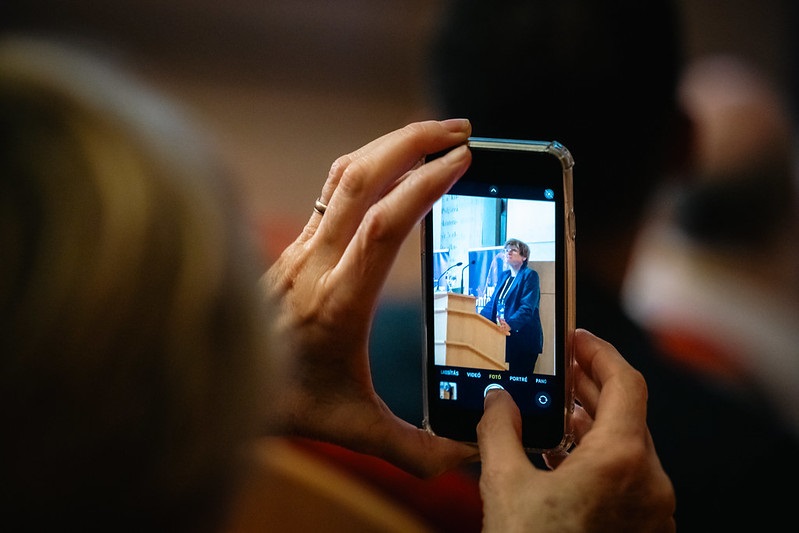
Katalin Karikó, a professor at the University of Szeged, is one of the founders and organizers of the International mRNA Health Conference, a nonprofit forum established in 2013 to annually showcase advancements in mRNA technology. She is well-acquainted with and closely follows international trends in the field. As such, it is no coincidence that the Szeged mRNA Conference was scheduled ahead of the 12th International mRNA Health Conference in Boston.
The Boston conference, held as a hybrid event from November 12 to 14, 2024, attracted 900 attendees. Among the speakers were Katalin Karikó, Drew Weissman, and Norbert Pardi – three researchers with strong ties to the University of Szeged – who participated in both events and, notably, referenced the Szeged symposium in Boston.
(We will continue our review of the mRNA Conference.)
Original Hungarian text by SZTEinfo
The writers would like to express their gratitude to PhD students Dóra Adamecz, Máté Csikós, Csaba Papp, Zóra Szilovics, Zsolt Tasi, and Éva Veres from the Institute of Biology, University of Szeged, for their invaluable contributions.
Photos by Ádám Kovács-Jerney and István Sahin-Tóth
The feature photo highlights the speakers of the mRNA Conference in Szeged – Persephone Borrow, Katrien Remaut, Robin Shattock, Karin Loré, Nicolas Manel, Zoltán Jakus, Gerald Schwank, Norbert Pardi, Uğur Şahin, Katalin Karikó, Drew Weissman, Martin Ridderstråle, Antal Nógrádi, Rein Verbeke, Jørgen Frøkiær, Tamás Kiss.
Photo by Ádám Kovács-Jerney, István Sahin-Tóth
Previous articles on the mRNA Conference:
mRNA: More Applications than Limitations - Highlights from the mRNA Conference
“Our thirst for knowledge drives us; we have discussions even at three in the morning.” – Press conference with Katalin Karikó and Drew Weissman
Szeged in the global spotlight as mRNA Conference kicks off
Countdown to the mRNA Conference: University of Szeged rolls out the red carpet
Beyond Vaccines: Dive into the World of mRNA with Coursera’s Latest Course
Fueling innovation: Why Novo Nordisk is backing the Szeged mRNA Conference
A real eye-opener: Coursera’s free course on mRNA
Groundbreaking mRNA research at the University of Szeged: New research center to drive future mRNA innovations
New advances in mRNA research spark hope – one year after Katalin Karikó’s Nobel Prize win
Just One Month to Go: Top-Tier Summit of the Scientific Scene Featuring Katalin Karikó at the University of Szeged
Ordinary days in the extraordinary life of a Nobel laureate: Katalin Karikó talks about a park bench in Philadelphia and mRNA researchers
University of Szeged to host two-day conference on the ‘Swiss Army knife’ of medical science
Top Researchers from Around the World will Present at the November 2024 mRNA Conference at the University of Szeged

